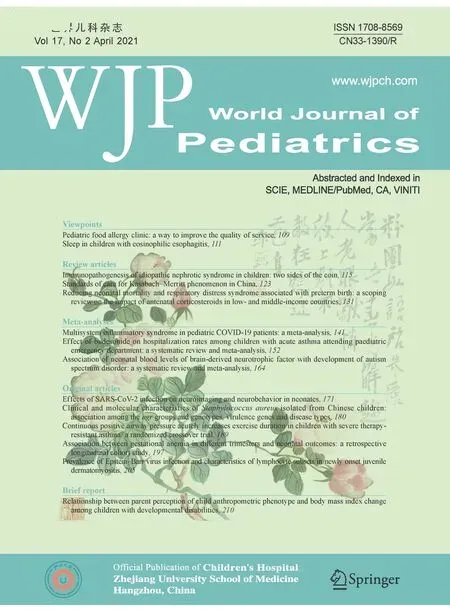Imipramine-precipitated status epilepticus
Ahmed Naguy
Frontal lobe epilepsy has a complex and atypical semiology that may masquerade as psychiatric or parasomnias [1].An electroencephalography (EEG) and sleep lab workup should be an integral part of clinical assessment of these cases to avoid potential pitfalls in management with serious consequences as evidenced in this clinical vignette.By mistaking epilepsy for anxiety,imipramine,a tricyclic antidepressant,known to lower seizure threshold,was prescribed and resulted in status epilepticus.This letter concludes with a brief literature review of antidepressants and seizure risk.
A six-year-old Lebanese girl was brought to the hospital by her recently divorced mother.The mother noticed her daughter lately experiencing sudden discrete episodes of awakening from sleep in the middle of night screaming,looking pallid,breaking a sweat,inconsolable,and,then totally amnestic to the event the next morning.Occasionally,she acted bizarrely.At times,this was associated with bedwetting.She was the only child,the product of a nonconsanguineous marriage and an uneventful elective caesarean section.She had normal developmental milestones with sphincters controlled at 3 years of age.The mother has been treated for neurotic depression on paroxetine.The girl had no medical history of note including absence of febrile seizures,head trauma and toxic exposures.She was not on medications;nor did she have a family history of epilepsy.She had normal thyroid function tests.On examination,she looked fretful,withdrawn,clinging to her mother,softspoken,with fleeting eye-contact,and startled.Her neurological exam was unremarkable.Given the current family vicissitudes,a diagnosis of adjustment disorder with prominent anxiety symptoms,comorbid with parasomnias-pavor nocturnus (night terrors) and secondary nocturnal enuresis was entertained.These ‘spells’ began to negatively impact her scholastic attendance because she kept feeling fatigued the next morning;therefore,she was prescribed imipramine 25 mg/d to help both anxiety and parasomnias.A baseline electrocardiogram was done (QTc of 330 ms).During a couple of weeks,the dose was titrated up to 75 mg/d.At this point,the girl ran serial seizures and was admitted to the intensive care unit (ICU) in a convulsive status epilepticus.EEG (transverse montage) was done and revealed frontal lobe epileptiform activity.MRI brain was done and came back normal.Retrospectively,these spells turned out to be epileptic activity and incontinence was mistaken for enuresis.Imipramine was discontinued by ICU team as it seems it had precipitated status because tricyclic antidepressants are notoriously pro-convulsants.The girl was discharged on carbamazepine,100 mg bid,with good control of seizures.Three months have elapsed and,at the time of writing this report,she is faring well with no sleep-related incidents.Complete blood count,serum carbamazepine level and serum sodium are periodically checked and are within the normal lab reference range.Viva voce consent of the mother was obtained beforehand to publish this case anonymously.
This case shows frontal lobe epilepsy (FLE) may produce unusual symptoms that can masquerade as a psychiatric disorder or a sleep disorder.It is commonly misconstrued and dismissed as histrionic gesticulations in casualty settings.FLE has a distinctive semiology,that is characterized by frequent seizures in stage 2 sleep,short duration,minimal postictal confusion,rapid secondary generalization,prominent motor manifestations,complex gestural automatisms(including sexual) at onset,frequent falling during seizure and frequent progression into status epilepticus [2].Given the complex and atypical semiology of FLE,an EEG should be an integral part of the workup for any complex sleep phenomena before embarking on medications because misdiagnosis may lead to inaccurate decisions of prescriptions with serious implications as in this report (i.e.prescribing the tricyclic antidepressant imipramine known to lower seizure threshold).History,frontal lobe epilepsy and parasomnia scale (FLEPS),polysomnography,and,video-EEG can be diagnostic validators in these cases.Some helpful clinical tips in favour of frontal seizures vs.parasomnias are given in Table 1.

Table 1 Differentiation diagnosis of frontal lobe epilepsy (FLE) vs.parasomnia
Depression is overrepresented in the epileptic population (two fold).It might be related to severity of epilepsy,focality and antiepileptic drugs [3].This is tied to increased suicidality (five fold) [4].It further negatively impacts cognitive domains.Tricyclic antidepressants (mostly throught H1 blockade),maprotiline (tetracyclic) and bupropion are known to lower seizure threshold and should be avoided altogether [5].
Interestingly,selective serotonin reuptake inhibitors(SSRIs) are not only a safer option but also might be anticonvulsants as demonstrated in animal models [6].Depression (possibly related to low 5HT tone) has been tied independently to increased risk of epilepsy 4-7 folds [7].When deploying SSRIs,it is advisable to avoid those known to be potent inhibitors of hepatic microsomal system hepatic microsomal cytochrome 450 (e.g.fluoxetine) to avoid potential pharmacokinetic interactions with antiepileptic drugs(with resultant toxicity).Also,it is better to avoid higher doses of SSRIs because some data indicate a pro-convulsant potential of SSRIs at higher doses (as the case with toxicity or overdosing).As such,risk appears to be dose-dependent and the younger population seems to be at a heightened risk as well as those with severe depression.Another possible mechanism for antidepressants-induced seizures is hyponatremia as part of syndrome of inappropriate secretion of anti-diuretic hormone.Anti-convulsant withdrawal seizures (e.g.poor compliance) should be considered as a differential diagnosis.
Author contributionAN is the only author of the letter to the editor.
FundingThere is no funding data for this article.
Compliance with ethical standards
Ethical approvalEthical committee approval is not normally required in our institute for short communications.
Conflict of interestAuthor declares no conflict of interests in the past 36 months.
 World Journal of Pediatrics2021年2期
World Journal of Pediatrics2021年2期
- World Journal of Pediatrics的其它文章
- Prevalence and characteristics of Kawasaki disease before and during the COVID-19 pandemic
- Relationship between parent perception of child anthropometric phenotype and body mass index change among children with developmental disabilities
- Prevalence of Epstein-Barr virus infection and characteristics of lymphocyte subsets in newly onset juvenile dermatomyositis
- Association between gestational anemia in different trimesters and neonatal outcomes:a retrospective longitudinal cohort study
- Continuous positive airway pressure acutely increases exercise duration in children with severe therapy-resistant asthma:a randomized crossover trial
- Effects of SARS-CoV-2 infection on neuroimaging and neurobehavior in neonates
